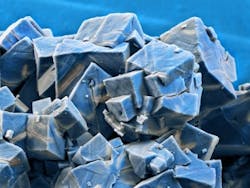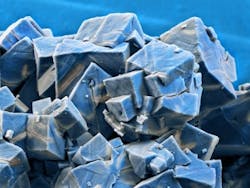MOFs Get Tryout
Researchers at BASF have developed a method for organic-solvent-free industrial-scale manufacture of metal organic frameworks (MOFs). Materials produced by the new method are currently being trialed in the U.S. in cooperation with an undisclosed customer for gas storage in natural-gas-fueled heavy-duty vehicles. The Ludwigshafen, Germany-based chemical company notes MOFs should enable these vehicles to travel double the distance without expanding fuel tank size. BASF adds that MOFs also hold promise for catalysis, as nanoreactors and in drug delivery.
The method, besides not relying on organic solvents, is simple and gives a higher material yield from an aqueous medium, says the company. In addition, it's suitable for existing BASF production plants.
"We are delighted at this significant advance in industrial-scale production, which is a crucial requirement for commercial use of these fascinating materials," notes Dr. Friedrich Seitz, head of chemicals research.
"MOFs have a large surface area… The gas is physically adsorbed at the surface. The size of the surface area can be influenced by different parameters like the used reactants and the synthesis process. That way, our MOFs can store twice to-three-times as much gas as conventional storage systems. Alternatively, with the same amount of gas the storage units can become smaller compared to conventional ones," explains Dr. Manuela Kummeter of BASF's Corporate Media Relations.
MOFs' highly crystalline structures with nanometer-sized pores allow them to store hydrogen and other high-energy gases. Their large surface area and high porosity on the nanometer scale enable MOFs to hold relatively large amounts of these gases. The pores's size and polarity can be fine-tuned for specific applications, notes BASF.
"The MOFs' large surface area is also an advantage in chemical reactions. That's why MOFs are also interesting for catalysis and as nanoreactors. Chemical reactions could take place in a small volume with high reactivity. The requirements differ from one reaction to the other. The MOFs for catalysis have to be tailor-made for each one. However, e.g., the metal dispersion is almost up to its most possible extreme of 100%. …Possible applications for MOFs in catalysis are c-c bonding reactions. They are [being] trialed currently in lab scale." says Kummeter.
BASF has been working to synthesize MOFs on an industrial scale for the last 10 years. The company has been collaborating with U.S. chemist Omar M. Yaghi, who discovered MOFs in the late 1990s, with the aim of developing MOFs with the largest possible surface area and storage density. Professor Yaghi, now at UCLA, recently synthesized a zinc carboxylate with a surface area of more than 10,000 m2/gram of material — about twice the highest surface areas of previous MOFs.

